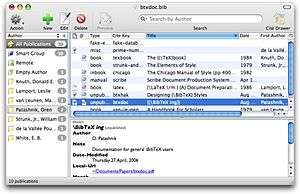BibDesk
|
Screen shot of BibDesk 1.3.8 | |
| Developer(s) | The BibDesk Team |
|---|---|
| Initial release | 2002 |
| Stable release |
1.6.5
/ November 30, 2015 |
| Repository |
sourceforge |
| Written in | C, Objective-C |
| Operating system | Mac OS X |
| Type | LaTeX |
| License | BSD |
| Website |
bibdesk |
BibDesk is an open-source reference management software package for Mac OS X, used to manage bibliographies and references when writing essays and articles. It is primarily a BibTeX front-end for use with LaTeX, but also offers external database connectivity for importing, a variety of means for exporting, and capacity for linking to local documents.
First launched publicly in 2002, BibDesk is under continuing development by various contributors via SourceForge. The original developer was Michael McCracken, and much of the code has subsequently been written by Adam Maxwell and Christiaan Hofman.[1] Also available directly from SourceForge, it is currently bundled with the MacTeX distribution of TeX.
Features
BibDesk offers a front-end for creating, editing, managing, and searching BibTeX databases. With integrated connectivity to external databases including PubMed, the U.S. Library of Congress, Web of Science, (and any other databases searchable via the Z39.50 or Entrez protocols), BibDesk enables one-click importing of references to articles and books listed in these databases and library catalogs. It also eases importing unformatted references from websites or documents without requiring that they be re-typed.
BibDesk permits articles residing on a user's computer to be linked to their BibDesk database entries via drag-and-drop, and will auto-file linked PDFs or other copies of articles in desktop folder. It provides a variety of ways to annotate citations which variously do or do not affect the underlying BibTeX data.
Though created to export in BibTeX format for use in LaTeX documents, BibDesk can also export citations formatted in any given citation style in plain text, RTF, HTML, and RSS. It does not itself contain citation styles (e.g. APA, MLA, Chicago), but through its integration with LaTeX it can automatically produce citations in any of the basic BibTeX styles, and can when used with BibTeX style-files replicate nearly any citation format. Since it creates previews of LaTeX output, it can format entire bibliographies internally if, for example, they are for use in something other than a LaTeX document.
See also
- Comparison of reference management software for some comparisons with similar packages.
